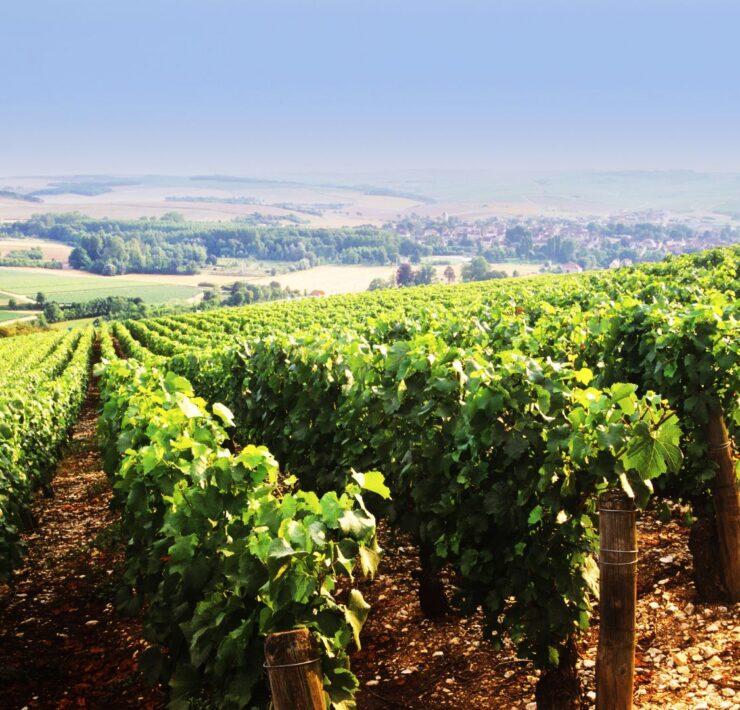As a prickly chill permeates the winter air, many wine enthusiasts seek solace in big, bold, and robust pours that echo the warmth of sunlit valley floors. Yet, amid the brisk temperatures, overlooked options await in the form of wines hailing from cooler climates. From coastal breezes to mountainous terrains, cool climate wines offer a contrasting character that boasts a brighter, acid-driven profile.
In this exploration of winter wines, we embark on a journey through the nuanced world of cool climate wines, where each sip unravels a narrative of resilience and vibrancy.
Cool Climate Wine Growing Regions
Cool climate wines come from areas that endure lower temperatures and a shorter growing season. This climatic condition fosters a slow and steady ripening process, producing grapes with balanced acidity and nuanced flavors. Picture a vineyard nestled on a misty hillside or along a breezy ocean coast — these environments are the birthplaces of exceptional cool climate wines.
Latitude serves as a pivotal player in defining a cool climate. These regions are farther from the equator, where the sun’s intensity weakens, offering a more temperate environment for grape cultivation.
Elevation adds another layer of complexity to cool climate winemaking. At higher altitudes, temperatures drop, providing a natural cooling effect. Vineyards perched on mountain slopes or plateaus experience cooler conditions, allowing grapes to develop slowly, enhancing their flavor profiles and preserving acidity.
Proximity to large bodies of water emerges as a crucial element in the cool climate equation. Coastal regions benefit from the sea’s moderating influence, where the vast water bodies act as thermal regulators. The oceanic breezes sweep the vineyards, preventing extreme temperature fluctuations and fostering a more stable climate.
Dramatic diurnal shifts also play an integral role in creating cool climate wines. The temperature difference between day and night is significant in these regions. Warm days foster ripening, while cool nights lock in acidity. The result? Wines with a vibrant tension, a delicate balance between ripe fruitiness and refreshing acidity.
Cool climate wines tell a tale of resilience, where grapes navigate challenging conditions to emerge as complex, expressive varietals.
Notable cool climate wine growing regions include:
- France: Alsace, Burgundy, Chablis, Champagne, Loire Valley
- Italy: Trentino-Alto Adige
- USA: Finger Lakes, Sonoma, Willamette Valley
- New Zealand: Marlborough
- Germany: Mosel
- Canada: Niagara, Okanagan Valley
Cool Climate Wines
What sets cool climate wines apart from their warmer counterparts? One word: balance. Cool climate wines are known for their lively acidity, which adds freshness and brightness to every sip. This acidity is complemented by nuanced fruit flavors that slowly develop over the growing season, resulting in vibrant and complex wines. Additionally, cool climate wines can often exhibit lower alcohol levels, making them perfect for easy sipping on brisk evenings.
Cool climate red grape varieties include:
Pinot Noir
When it comes to cool climate reds, Pinot Noir takes the spotlight. This grape thrives in cooler temperatures, producing silky textures and red fruit flavors. Enjoy a cool climate Pinot Noir with a mushroom risotto or roasted root vegetables, and you’ll understand why it’s the perfect companion for chilly evenings.
Try: Hartford Court Russian River Pinot Noir 2022

Offering bright red and dark berry aromas, this wine is juicy and precise, with complementing notes of coffee beans and matchsticks. The tannins are initially soft, slowly building to a suppleness that layers with keen acidity and stony minerality.
This wine comes from four areas within Sonoma’s Russian River Valley AVA: Green Valley, Laguna Ridge, Sebastopol Hills, and the Santa Rosa Plains.
Gamay
Gamay, known for its light and fruity profile, shines in cool climate regions. Wines like Beaujolais from France bring a touch of joy to winter with their red berry flavors and refreshing acidity. Serve slightly chilled and pair with charcuterie or roasted chicken for a delightful winter feast.
Try: La Grosse Pierre Fleurie Bel Air 2021

Domaine de la Grosse Pierre Fleurie Bel Air 2021 epitomizes the finesse and charm of the Fleurie appellation in Beaujolais, France. In the glass, it unveils complex aromas of red berries, violets, and subtle earthiness. On the palate, the wine unfolds with silky tannins, layers of raspberry and cherry, and a hint of spice lingering in a graceful finish.
Merlot
Often overshadowed but incredibly deserving of attention, Merlot thrives in cool climate regions. The soft, velvety texture and approachable nature of cool climate Merlot make it a warming choice for winter nights. Its subtle tannins and lush character make it an ideal partner for comforting dishes like beef stew or lamb chops, bringing extra coziness to your cold-weather indulgences.
Try: Captûre Pine Mountain Merlot 2019

The vineyards for this Merlot straddle Pine Mountain’s highest peak at a jaw-dropping 3,000 feet, Sonoma’s highest elevation. This savory wine offers a magnificent nose with loads of cinnamon heart candy and mulling spice aromas alongside black licorice, muddled raspberries, and ripe blackberries. The medium body has a textural mouthfeel, gritty tannins and a lengthy finish.
Cool climate white grape varieties include:
Chardonnay
Chardonnay, a versatile white grape, reigns supreme in cool climate regions. With its crisp acidity and a spectrum of flavors from green apple to subtle oak, cool climate Chardonnays are a refreshing companion to winter evenings. Whether unoaked and refreshing or barrel-aged for added complexity, these wines provide a perfect balance to rich winter fare.
Try: Domaine Pignier Côtes du Jura Chardonnay de la Reculee 2022

Domaine Pignier is a prominent organic and Demeter® certified producer in Jura, a region in eastern France nestled between Burgundy and the Swiss border.
The Chardonnay de la Reculee highlights subtle notes of white flowers, pears, and apricots alongside nuanced buttery and vanilla character. The flavors are mouth-filling on the palate, balancing acidity and a creamy roundness, leading to a vibrant finish.
Sauvignon Blanc
With its lively acidity and vibrant citrus notes, Sauvignon Blanc is another cool climate favorite. Hailing from regions like Marlborough, New Zealand, or the Loire Valley, these wines offer freshness that cuts through the winter chill. Pour a glass alongside a plate of goat cheese and winter greens for a delightful pairing.
Try: Seresin Sauvignon Blanc 2022

Seresin Sauvignon Blanc is made from 100% organic grapes that contribute to a textural and expressive wine, showcasing lively citrus notes, tropical fruit, and a signature crisp acidity. However, including 10% Sémillon with seven months of lees aging in oak completes a somewhat atypical style of the Marlborough region, displaying great age ability and complexity.
Riesling
In the realm of cool climate whites, Riesling brings a burst of freshness to cold winter days without overwhelming the palate, balancing zesty acidity with bright fruit notes. Riesling’s versatile nature complements a range of winter dishes, from spicy Thai curries to glazed ham or even a simple apple pie for dessert.
Try: Tantalus Riesling 2022

Tantalus Vineyards, located in British Columbia’s Okanagan Valley, is renowned for its high-quality Rieslings. They embrace sustainable and organic practices, contributing to the distinct character of their wines.
Tantalus Riesling 2022 is off-dry and showcases the remarkable terroir of the region, offering a delightful balance of fruitiness and acidity. It delivers aromas of white peach, mandarin orange, grapefruit pith, and hints of wet stone. Fresh and vibrant on the palate, with irresistible sweetness and razor-like acidity.









